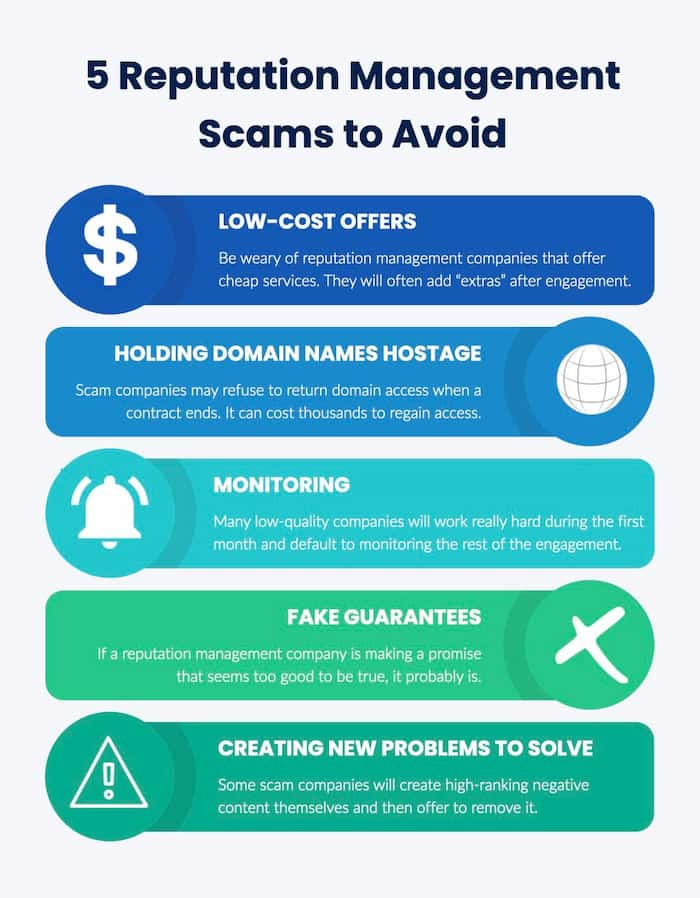Are Reputation Management Services Legit?

Most people have no idea how a net reputation campaign works. This lack of knowledge is frequently leveraged by shady reputation firms. Here is how to avoid the worst of it.
Online reputation management is a specialized field that requires a deep understanding of marketing, branding, public relations, SEO, and other technical skills.
Since online reputation management services are in high demand, many companies enter this industry despite not having the required skills. These companies attract clients by making big claims, unrealistic promises, and commitments they cannot fulfill. Naturally, they fail to deliver value, waste their clients’ hard-earned money, and often cause more damage to their reputations.
After years of successfully delivering online reputation management services for our clients, Reputation X has identified the five most common types of scams you should look out for before hiring an online reputation management company.
We have decided to share these tips with you in this blog.
Please make sure to read these tips before you plan to hire an online reputation management company to avoid problems later down the road.
Top five reputation management scams
- The start cheap and up-sell scam
- Holding domain names hostage
- One month of work and eleven months of monitoring
- The fake guarantee scam
- Causing problems – then offering to solve them
- How to avoid these online reputation management scams

1. The start cheap and up-sell scam
It starts with a low-cost offer. Then, after engagement, the “extras” are added on.
Many reputation management scams start with extraordinarily cheap reputation service packages that offer unbelievable value. However, once the contract is signed and the customer gets onboard, dodgy online reputation management companies ask clients to pay more for the promised services.
For example, if search engine optimization is included in the basic package, they only perform the fundamental SEO tasks and ask clients to pay more if they want better services.
Beware of net reputation management scams that employ the “start cheap and up-sell” tactic. Keep an eye out for these red flags:
- Unbelievable value: If a reputation service package seems too good to be true, it probably is.
- Lack of transparency: If a net reputation management company hesitates to provide clear, detailed information about service costs and what’s included in a package, that is a major warning sign.
- Additional charges: Watch for sudden requests for extra charges after you’ve signed the contract, especially if the services were initially included in your strategy.
2. Holding domain names hostage
Cheating people after they’ve signed a contract and been delivered sub-par work is a common scam in the online reputation management industry.
When clients get onboard, reputation management companies get access to their web hosting and domain names for search engine optimization and other online reputation management-related activities.

When the client terminates the contract, these scamming online reputation management companies refuse to return the domain access. In many cases, companies and individuals have had to pay thousands of dollars to get their domains back.
Here’s how to protect yourself from this scam:
- Read contracts carefully: Make sure that your contract clearly outlines the terms for domain access and transfer once services are completed.
- Document everything: Keep thorough records of all of your communication, contracts, and terms with your reputation management company. You never know if you may need them in the future.
- Consult a lawyer: Consider seeking legal counsel to navigate the process of regaining access to your domains.
3. One month of work and eleven months of monitoring
Online reputation management is a specialized service that requires continuous work throughout the client’s contract. Many low-quality online reputation management companies work really hard in the first month to win the client’s confidence.
Once the client starts trusting them, they take the foot off the pedal and go into reactive mode and only monitor things for the rest of the contract duration instead of playing an active role. In most cases, such agencies get back to action one month before the contract renewal date so that they have some results to show.
To protect yourself from falling victim to this scam:
- Thoroughly vet reputation management companies: Before you sign a contract, read their net reputation reviews, ask for references, and gauge their track record.
- Clarify expectations: Clearly outline your expectations for ongoing, proactive reputation management. Establish goals for every month.
- Consider shorter contracts: Consider starting with a trial period or shorter contract lengths to avoid falling into a monitoring scam.
4. The fake guarantee scam
Online reputation management is largely related to search engine optimization and search results on Google.
No online reputation management company in the world can guarantee that a client’s website will always rank number one on Google or that no negative content will ever make it to the top pages of Google searches.
Promises such as these are truly beyond the control of any online reputation management company.
A legitimate company would share a plan with the client and convince them that they will keep things under control. They would be honest and open and not make unrealistic promises and guarantees.
Here’s what to watch out for:
- Unrealistic promises: Google can be unpredictable sometimes, so any good reputation management company will admit this and establish realistic expectations from the beginning.
- Guarantees vs. commitments: Watch out for empty promises or “guarantees.” Instead, look for companies that make commitments and have a solid long-term strategy.
5. Causing problems – then offering to solve them
Online reputation management companies commonly fool non-technical clients by creating negative content and ranking it higher on Google.
Once the client learns about it, fake online reputation companies remove the negative content and pretend they had to work hard for it. Non-technical clients tend to fall for this trick.
How to avoid these online reputation management scams
When hiring an online reputation management company, brands should consider taking the following actions in order to avoid scams:
- Research the online reputation management firm in detail
- Research their team on LinkedIn or other relevant platforms to see if they have the required skill set and experience to handle the account
- Ask for their portfolio and connect with their previous clients for feedback
- Ask the online reputation management firm to share a plan of action, and if they make unrealistic promises and claims, avoid them
- Talk with the reputation strategist, and ask them how your project differs from similar projects
- Hold monthly or quarterly performance meetings with them
Online reputation management scams are common, even with well-known companies, but it’s not impossible to avoid them. With a little research, careful background checks, and regular follow-ups, brands can make sure that their online reputation management agency is on the right track.
Reputation management scams FAQs
What are the most common reputation management scams?
1. The start cheap and up-sell scams. 2. Holding domain names hostage. 3. One month of work and eleven months of monitoring. 4. The fake guarantee scam. 5. Causing problems – then offering to solve them.
How can I avoid reputation scams?
Thoroughly research several net reputation management companies before making a decision. Research their team on LinkedIn or other relevant platforms to see if they have the required skill set and experience to handle the account. Ask for their portfolio and connect with their previous clients for feedback. Ask the online reputation management firm to share a plan of action, and if they make unrealistic promises and claims, avoid them. Talk with the reputation strategist ask them how your project differs from similar projects. Hold monthly or quarterly performance meetings with them.
Why do reputation management campaigns fail?
Since online reputation management services are in high demand, many companies enter this industry despite not having the required skills. These types of companies attract clients by making big claims, unrealistic promises, and commitments they cannot fulfill. Naturally, they fail to deliver value, waste their clients’ hard-earned money, and often cause more damage to their reputations.
About the author
Kent Campbell is the chief strategist for Reputation X, an award-winning online reputation management agency based in California. Kent has over 15 years of experience with online reputation management, Wikipedia editing, review management, and strategy. Kent has helped celebrities, leaders, executives, and marketing professionals improve how they are seen online. Kent writes about reputation, SEO, Wikipedia, and PR-related topics and is an expert witness for reputation-related legal matters.
